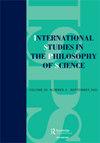波普尔的“理性原则”与“认识论”理性:调和的尝试
IF 0.8
2区 哲学
Q2 HISTORY & PHILOSOPHY OF SCIENCE
International Studies in the Philosophy of Science
Pub Date : 2020-10-01
DOI:10.1080/02698595.2021.1960108
引用次数: 1
摘要
“情境分析”构成了波普尔对社会科学的方法论建议。一方面,波普尔坚持认为我们通过“试错消除”来学习,另一方面,他宣称他的“理性原则”(RP)与他的“知识和学习的进化理论”中隐含的理性的认识论描述无关,这一事实显然是不一致的。我们认为,波普尔做出这种主张的最有可能的原因是,他对社会科学的表述最好被解释为他对历史“方法”的看法延伸到理论社会科学。鉴于此,我们认为,在后一种情况下,情景认知的实施可能需要采用一种扩展的“理性原则”(ERP),即科学家假设个体行为者同时表现出实践理性和认知理性。我们根据SA分别是基于ERP还是RP,确定了SA的两种变体,分别称为SA1和SA2,并讨论了社会科学中代表它们的一些方法。我们的结论是,在波普尔的情景建构中,ERP的采用有助于减轻社会互动的缺失。本文章由计算机程序翻译,如有差异,请以英文原文为准。
Popper's ‘Rationality Principle’ and ‘Epistemic’ Rationality: an Attempt at Reconciliation
ABSTRACT ‘Situational Analysis’ (SA) constitutes Popper's methodological proposal for the social sciences. There is an apparent inconsistency in the fact that, on the one hand, Popper maintains that we learn by ‘trial and error-elimination’ and, on the other hand, he declares that his ‘Rationality Principle’ (RP) has nothing to do with the epistemic account of rationality implicit in his ‘evolutionary theory of knowledge and learning’. We claim that the most likely reason Popper makes such claim is that his formulation of SA is better interpreted as an extension of his view of the ‘method’ of history to the theoretical social sciences. In light of it we argue that the implementation of SA in the latter may require the adoption of an expanded ‘Rationality Principle’ (ERP) whereby scientists assume that individual actors exhibit both practical and epistemic rationality. We identify two variants of SA we denote as SA1 and SA2 according to whether they are grounded on ERP or RP respectively and discuss some approaches in the social sciences that are representative of each of them. We conclude that the adoption of ERP helps mitigating the absence of social interaction in Popper's formulation of SA.
求助全文
通过发布文献求助,成功后即可免费获取论文全文。
去求助
来源期刊

International Studies in the Philosophy of Science
HISTORY & PHILOSOPHY OF SCIENCE-
自引率
12.50%
发文量
10
期刊介绍:
International Studies in the Philosophy of Science is a scholarly journal dedicated to publishing original research in philosophy of science and in philosophically informed history and sociology of science. Its scope includes the foundations and methodology of the natural, social, and human sciences, philosophical implications of particular scientific theories, and broader philosophical reflection on science. The editors invite contributions not only from philosophers, historians, and sociologists of science, but also from researchers in the sciences. The journal publishes articles from a wide variety of countries and philosophical traditions.
 求助内容:
求助内容: 应助结果提醒方式:
应助结果提醒方式:


